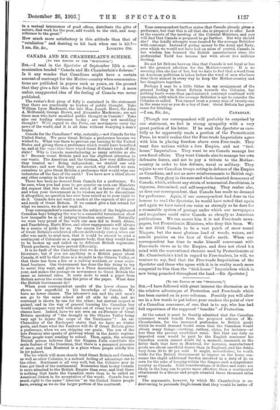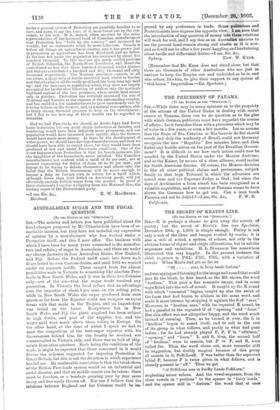[TO THE EDITOR OF THE .. 13PECTATOR.1 SIE,—I have followed with
great interest the discussion as to • the relative advantages of Protection and Free-trade which has been carried on in your columns. Possibly you will allow me in a few words to put before your readers the point of view of a Canadian consumer, of one, that is to say, who has had full experience of the supposed " benefits " of Protection.
At the outset it must be frankly admitted that the Canadian consumer would benefit from the proposed scheme of Mr. Chamberlain, for the increased preference to British goods which he would demand would mean that the Canadian would obtain many things—clothing, cutlery, china, for instance—at less than the present exorbitant rates. But that any duty on imported corn would be paid by the English consumer his Canadian cousin cannot doubt for a moment, inasmuch as the latter finds that here in Montreal, for instance, manufactured goods are about one-third dearer than in England, and the duties vary from 20 to 30 per cent. It might, nevertheless, be worth while for the British Government to impose on the home con- sumer the slight additional 'burden involved in a duty of 2s. on corn for the sake of keeping within the Empire such a magnificent country as Canada Solid considerations of dollars and cents are likely in the long run to prove more effective than a sentimental attachment to Ahrone and people situated three thousand miles away.
The arguments, however, by which Mr. Chamberlain is 'en- deavouring to persuade Englishmen that thoy would be better. off
under a general system of Protection are painfully familiar to us here, and have, to say the least of it, been found out by the con- sumer, to his cost. It is, indeed, often asserted by the noisy representatives of the favoured band of Canadian manufacturers that Protection has " built up the country" and increased its wealth ; but no statements could be more fallacious. Canada is before all things an agricultural country, and it has grown just in proportion as agriculture has been developed, and no faster. In the last ten years the population has increased by about five hundred thousand. To this increase the newly settled portions of British Columbia, the North-West Territories, and Manitoba contributed no less that three hundred thousand, whilst Quebec and Ontario contributed a hundred and fifty thousand and sixty thousand respectively. The Western provinces contain, as all are aware, a large area of fertile unsettled land, whilst in Quebec and Ontario almost all the really good land has been long ago used up ; and the increases iu population which they show are largely accounted for by the slow filtration of settlers into the northern highland regions of the two provinces, where arable land occurs only in patches. Protection has certainly increased the size of Montreal and Toronto at the expense of the surrounding country, and has enabled a few manufacturers to grow enormously rich by levying tribute on the farmers, and, as a natural consequence, able to bring strong financial pressure to bear on the Government ; but I fail to see how any of these results can be regarded as desirable.
Had we had Free-trade, we should, no doubt, have had fewer home industries, but our great staple industries of farming and lumbering would have been infinitely more prosperous, and our population would have increased more rapidly, since the farmers would have made more money. In time, by the development of water-power, we should have developed manufactures, and then we should have been able to export these, for they would have been produced at low cost under Free-trade conditions. One of the worst features about Protection is that its beneficiaries are, like the daughters of the horse-leech, never satisfied. The Canadian manufacturers, not content with a tariff of 30 per cent., are at present clamouring for duties of from 60 to 80 per cent., and appear to be trying to delude themselves and others into the belief that the British Government will be naive enough to impose a duty on foreign corn in return for a tariff which, although lower than that levied on American goods, will yet effectively exclude British wares from the market. In proof of these statements I enclose a clipping from the Montreal Star, the leading organ of the Protectionist party.
—I am, Sir, &e., E. W. MACBRIDE.
Montreal.







































 Previous page
Previous page